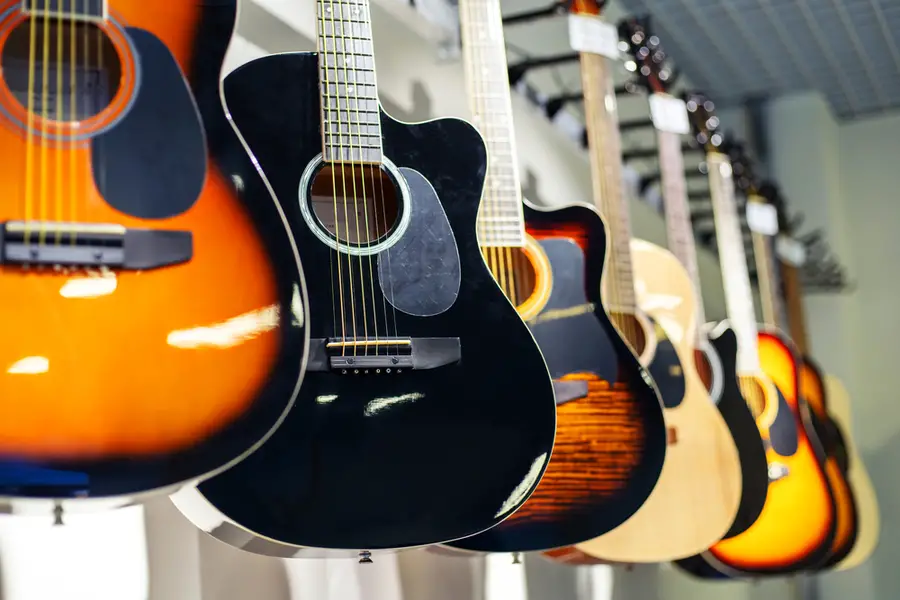
When searching for a guitar to buy, many beginners ignore the importance of the guitar’s weight. But no matter how good you think a guitar’s sound is when you pluck it, you won’t fully enjoy it if it’s too heavy.
For starters, you won’t be able to play the guitar for long without getting tired. You will also find difficulty in shipping or traveling with the guitar, and with all this, it’s only fair to want to know the weight of a guitar.
So how much does a guitar weigh?
Acoustic guitars don’t weigh as much as electric guitars. On average, an acoustic guitar weighs between 2 and 6 lbs( 0.9 and 2.7kg), while an electric guitar weighs between 6 and 13 pounds(2.7 to 9kg). Although both guitars have heavier models that weigh more, their weight is generally based on their type of wood, size/shape, neck type, hardware, and pickups.
Here we’ll look into the weight of acoustic and electric guitars and try to understand some of the major factors that influence their weight.
What Factors Affect the Weight of a Guitar?
It’s almost impossible to account for every factor affecting a guitar’s weight. However, there are some things that greatly affect the guitar’s weight, and knowing them will help you make better choices when searching for a guitar to buy.
1. Type of Wood

It’s common knowledge that wood is the most important material in guitar production. They are used in virtually all guitar parts, so the type of wood usually plays the most vital role.
Acoustic guitar’s tonewoods are either solid or laminated. Solid guitars will weigh more, while the laminated ones are lighter. This is due to the density of the different materials used. For example:
- Maple weighs between 550-720 kg/m³
- Mahogany weighs between 430-650 kg/m³
- Rosewood weighs between 400-900 kg/m³ (types of rosewood vary)
Mahogany has a reputation for being the heaviest wood used in guitar making, but rosewoods like the Brazilian and Eastern Indian rosewoods are far heavier.
Also, guitars are not built with only one type of wood. A guitar can have a body made of Rosewood or Mahogany, a neck made of maple, and a Spruce top. All this together will determine how much the guitar will weigh.
On the other hand, electric guitars can be lightweight or heavyweight based on the type of wood used in production.
Lightweight Guitars
Most lightweight guitars like Fender make use of Alder wood. Alder is one of the lightest woods used in guitar production and is known for its bright sounds.
Fender lightweight guitars formerly used swamp ash, and even though Alder wood has proven to be better on all fronts, some Fender models still use swamp ash.
Lastly, some lightweight guitars don’t use wood at all. They are built with carbon fiber and are immune to the environmental defects common with wooden guitars. These guitars are very light and perfect for traveling guitarists. Most of them weigh around 2 lbs.
Heavyweight Guitars
Heavyweight guitars, as the name goes, are heavier than lightweights. The Gibson Les Paul brand is known for producing these guitars with bodies made of Mahogany and an extra layer of maple for aesthetics.
Heavyweight guitars are famous for their rich tone. Many also believe that they provide better sustain.
Unfortunately, their weight makes them very hard to play for long. They mostly weigh around 12 pounds and are not ideal for beginners.
2. Size and Shape

This is a no-brainer; the size and shape of the guitar will have a huge impact on its weight. Bigger guitars generally mean more wood was needed to build.
Here are some of the most common acoustic guitar designs and their accompanying weights.
Parlor and Tenor Guitars
About a century ago, parlor guitars were even more popular than regular guitars. These guitars are significantly smaller than the standard acoustic and have a smaller waist. Their comfortability makes them the ideal guitars for beginners.
Tenor guitars are completely different from the standard acoustics in that they come with only four strings and are tuned CGDA. The body size of these two guitars is small; on average, they weigh 2 lbs.
Concert and Grand Concert Guitar
The difference between the two is small, and most guitar companies won’t specify them. Concert guitars are slightly smaller than your standard dreadnoughts, and as a result, they are lighter and produce calmer sounds. These guitars weigh between 3-5 lbs.
Auditorium and Grand Auditorium Guitar
Are you a fingerpicker or a fingerstyler? Whichever, the grand auditorium is perfect for you.
The GA is the beautiful amalgamation of the grand concert and dreadnought guitars. They are bigger than grand concert guitars but smaller than dreadnoughts.
Most grand auditorium guitars will weigh between 4-5 lbs.
Dreadnoughts
Dreadnoughts are probably the most common acoustic guitar shape available today. Since Martin introduced them in the early 1900s, they have grown to become a symbol of acoustic guitars
At least 7 in 10 people would draw a dreadnought if you asked them to describe an acoustic guitar; that’s just how popular they are.
They are slightly bigger than grand auditorium guitars and are loved for their versatility. Though models vary, most dreadnoughts will fall in the 5-6 lbs range.
Pickups, hardware, and other guitar components also contribute to its weight.
Examples Of Famous Acoustic & Electric Guitars And Their Weight
Now that we’ve seen some factors that influence a guitar’s weight. Let’s look at some of the more popular guitars you might have seen or heard of and check their weights.
Acoustic Guitars

Here are some popular acoustic guitars and their weights:
1. Fender Acoustasonic Telecaster
Fender tried to build the acoustic version of the Telecaster and came up with the Acoustasonic Telecaster. It comes with a pickup and a resonator.
Weight: 4.9 lbs
2. Martin D-28 Dreadnought
It’s almost impossible to curate a list of top dreadnought guitars without including the almighty D-28. The Martin D-28 has been serving acoustic guitarists for decades. Usually, it comes with a body made of Adirondack red or Sitka Spruce, a neck made from Mahogany and an ebony fretboard.
Weight: 4.8 lbs
3. Martin D-15 Dreadnought
The D-15 is another Martin classic. It’s one of the guitar’s cheapest models and has its body and top material made from Mahogany. They are also one of Martin’s lightest dreadnoughts.
Weight: 3.8 lbs
Electric Guitars

Here are some popular electric guitars and their weights:
1. Gretsch White Falcon
Gretsch is easily one of the most versatile guitars out there. It’s no surprise why the Beatles’ George Harrison loved and played them regularly. The White Falcon is a hollow body electric guitar built from maple, but despite being hollow, the White Falcon still falls into the heavyweight category.
Weight: Around 9 lbs
2. Gibson Les Paul
Les Paul is one of the world’s leading manufacturers of electric guitars. Their guitars usually come with maple or mahogany bodies and necks. The fretboards are either built from maple, ebony, or rosewood. That’s why they’re usually very heavy.
Even with the brand’s newer models trying to adopt a chambered pattern, their guitars are still heavier than most others.
Weight: 9-13 lbs
3. Fender Stratocaster
It’d be criminal to mention Gibson Les Paul without Fender Stratocaster. After all, they are both the most popular guitars in the world today.
But unlike the Gibson Les Paul, Fender Stratocaster is lighter. They use alder wood for their guitar body and maples/rosewood for their neck and fretboard.
Weight: Below 8 lbs
The Bottom Line
The guitar is an instrument you carry when you play, so there’s nothing wrong with you wanting to know a guitar’s weight before you purchase one.
Generally, most acoustic guitars weigh between 2-6 lbs, while electric guitars weigh between 6-13 lbs. Some factors that affect the guitar’s weight include the type of tonewood used, the size/shape of the instrument, plus the hardware and pickup available.
So before choosing a guitar, ensure it fits your taste and style. Above all, it must be comfortable and easy to play because that’s the only way you’d be to enjoy it.









